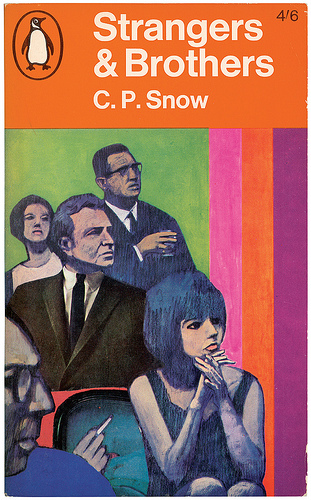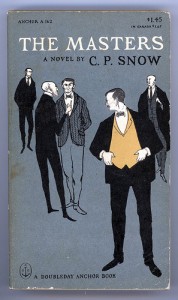I’ve thought about The Masters quite a bit since then, and I’ve wanted to re-read it. I’ve read two of the other books in the series, but I thought it was time to go back and start from the beginning, to see if the whole edifice stands up. More posts to come here about the first book: originally published with the title the series eventually took, and then republished as the Victorian-sounding George Passant.
Strangers and Brothers
I’m currently reading the first entry in C.P. Snow’s series Strangers and Brothers, which he published between 1940 and 1970 — a series of books about (in no particular order) friendship, power, ethics, and (more I think than anything else) a sort of vanishing-but-not-yet-gone kind of English masculinity. A single character — the authorial stand-in Lewis Eliot — narrates each of the eleven volumes, in which he is usually at a Nick Carraway-ish distance from the action, and the series itself moves with him from poor-young-striver to placid establishmentarian oldbody.
I became interested in the series after finding its most famous entry — The Masters — in an edition with a striking Edward Gorey cover. The story, about an election in an unnamed Cambridge college, is an understated drama of academic political maneuvering and shifting personal allegiances that created a kind of quiet, spellbinding air of suspense. But while it’s definitely the best-known of Snow’s otherwise completely neglected work, that’s not saying much, at least in the U.S. (the BBC freshly adapted the series for radio a few years ago). Snow himself was a physical chemist-turned-politician, and whose lecture on the “Two Cultures” (the sciences and the humanities) and the communication gap between them was widely reprinted and anthologized. (Given that it seems almost comically antiquated to worry about that *particular* cultural divide in this post-knowledge era, it’s perhaps less mysterious that few people are reading Snow.)



